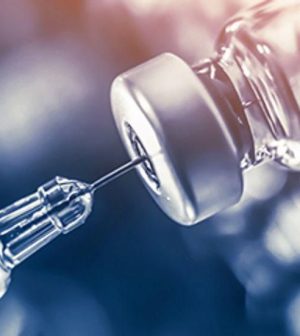- Recognizing the Signs of Hypothyroidism
- 10 Strategies to Overcome Insomnia
- Could Artificial Sweeteners Be Aging the Brain Faster?
- Techniques for Soothing Your Nervous System
- Does the Water in Your House Smell Funny? Here’s Why
- Can a Daily Dose of Apple Cider Vinegar Actually Aid Weight Loss?
- 6 Health Beverages That Can Actually Spike Your Blood Sugar
- Treatment Options for Social Anxiety Disorder
- Understanding the Connection Between Anxiety and Depression
- How Daily Prunes Can Influence Cholesterol and Inflammation
One Dose of Pfizer Vaccine May Be Enough for Folks Who’ve Had COVID

I think I’ve had COVID-19 already, so do I really need two doses of vaccine?
It’s a question millions of people around the world are asking, and now a small, new study finds that people who know they were infected with SARS-CoV-2 in the past may need only one shot of the Pfizer vaccine to gain strong immunity.
In fact, “we observed higher SARS-CoV-2 antibody levels in previously infected individuals after 1 dose of [the Pfizer vaccine], compared with infection-naive individuals after 2 doses,” concluded a team led by Dr. James Moy, of the division of allergy and immunology at Rush University Medical Center in Chicago.
What’s more, giving previously infected people a second dose of the Pfizer vaccine did little to boost their antibody levels further, “suggesting that 1 dose may be acceptable in this group,” the researchers added.
The bottom line: “Individuals with a documented prior COVID-19 infection may be sufficiently protected from reinfection after a single mRNA vaccine dose, which could free up availability of millions of additional doses,” Moy’s group reported.
The new study was small — 29 Chicago-area residents with a prior case of COVID-19 infection based on PCR testing, and another group of 30 people with no such histories.
Participants averaged 42 years of age, and about three-quarters were women.
The study highlighted that prior infection alone is not a robust defense against COVID-19: At baseline, the arbitrary units-per-milliliter (AU/mL) in blood samples for antibodies against SARS-CoV-2 in people who’d previously encountered the virus was about 621. After one dose of the Pfizer vaccine, that level soared to a much more protective level of 30,000 AU/mL, Moy’s team reported.
Adding in a second dose of vaccine only nudged that number up slightly higher, to about 37,000 AU/mL.
For folks who had never encountered SARS-CoV-2 before, two vaccine doses were definitely needed to reach a good level of protective antibodies. After one dose, this group’s antibodies averaged just over 1,800 AU/mL in blood samples, but after getting a second dose that number jumped to more than 15,000 AU/mL, the research team said.
So, while two doses of the Pfizer vaccine are essential if you’ve never had COVID-19, one dose may be enough if you’ve already had it, the team concluded.
One expert in infectious disease said the findings could be important to vaccine rollouts across the United States and globally.
“Some proportion of the vaccine-hesitant are those who have had prior infection who are confused as to why they would be treated exactly as somebody without any prior immunity,” explained Dr. Amesh Adalja, who wasn’t involved in the new research.
The new data “should be used by [the U.S. Centers for Disease Control and Prevention] to update recommendations for those who have had prior infection, allowing them to need just one dose [of the two-dose vaccines] to be considered fully vaccinated,” said Adalja, who is senior scholar at the Johns Hopkins Center for Health Security, in Baltimore.
“This could increase the number of people vaccinated and remove a talking point of the anti-vaccine groups, who say that prior natural immunity is being ignored,” he added.
The findings were published online Aug. 6 in JAMA Network Open.
More information
Find out more about the safety and benefits of COVID-19 vaccination at the U.S. Centers for Disease Control and Prevention.
SOURCES: Amesh Adalja, MD, senior scholar, Johns Hopkins Center for Health Security, Baltimore; JAMA Network Open, Aug. 6, 2021, online
Source: HealthDay
Copyright © 2026 HealthDay. All rights reserved.










